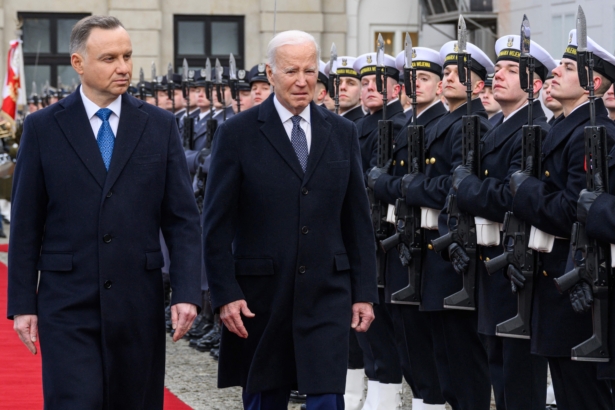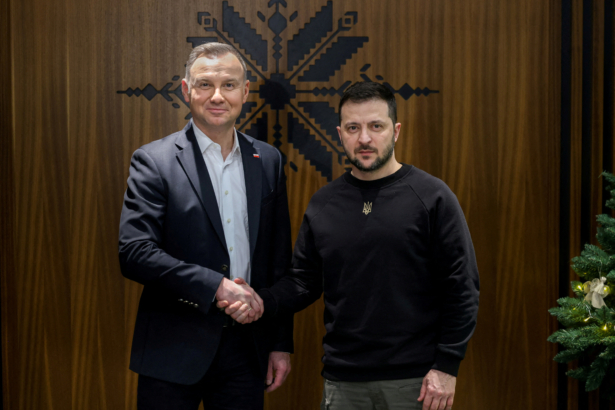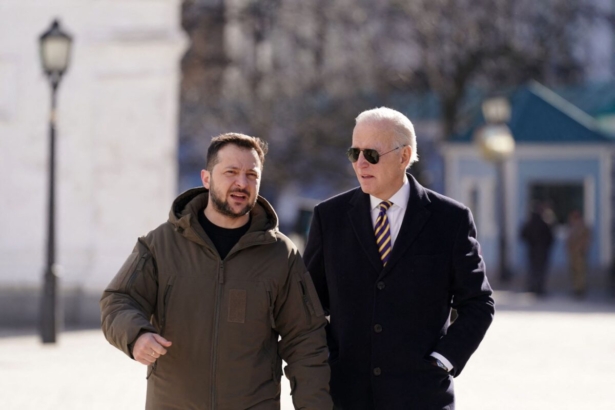U.S. President Joe Biden delivered a speech in Warsaw on Feb. 21, during which he praised his Polish hosts and reiterated Washington’s steadfast support for the Ukrainian war effort.
He also roundly condemned Russia’s invasion of Ukraine, which was initially launched on Feb. 24, 2022.
The U.S. president was introduced by his Polish counterpart, Andrzej Duda, who thanked the United States and NATO for supporting Ukraine and defending “the free world.”
“Long live Ukraine, long live NATO, long live the United States, long live Poland,” Duda exclaimed. “There is no freedom without solidarity.”

Since the conflict began, NATO member Poland has been one of Kyiv’s staunchest supporters, providing Ukraine with scores of combat tanks.
Taking the podium shortly afterward, Biden greeted the people of Poland, whom he described as “our great allies.”
“One year ago, the world was expecting Kyiv to fall,” he declared. “But I just returned from Kyiv, and I can tell you that Kyiv still stands tall.”
On Feb. 20, Biden paid a brief visit to Ukraine, where he met Ukrainian President Volodymyr Zelenskyy and pledged an additional $500 million in aid for Kyiv.
Last December, Biden hosted Zelenskyy at the White House, where he reiterated his administration’s “unwavering” support.
Since Biden took office in January of 2021, the United States has provided Ukraine with more than $25 billion in security assistance.
Speaking in Warsaw, Biden said that when Russian President Vladimir Putin “ordered his tanks to roll into Ukraine, he thought we would roll over.”
“He was wrong,” Biden asserted. “Instead, he found himself at war with a man whose courage was forged in fire and steel: Volodymyr Zelenskyy.”
“Putin doubts we have staying power,” he added. “But our support for Ukraine will not waver.”
Biden also responded to claims made by Putin in a Moscow address delivered earlier Feb. 21.

“We do not seek to control Russia. We are not plotting to attack Russia, as Putin said today,” Biden said. “Putin chose this war, and he could end it today with a word.”
Referring to last year’s Ukrainian counter-offensives, he added: “From Kherson to Kharkov, Ukrainian forces have reclaimed their land. The blue and yellow flag waves once again.”
As he did in Kyiv the previous day, Biden also used the occasion to reiterate Washington’s continued support for Ukraine.
The United States, he said, was at the forefront of a “50-nation coalition” devoted to supporting Kyiv and ensuring it “has what it needs to defend itself.”
Biden also hailed the bipartisan nature of U.S. support, saying, “Both Democrats and Republicans have come together to support Ukraine.”
Referring to the vast array of Western-led sanctions on Russia’s economy, Biden added: “We continue to maintain the largest sanctions regime of any country in history.”
Biden concluded by praising the 30-member NATO alliance, which he described as the “strongest defensive alliance in the world.”
He also claimed the alliance was “more unified than ever before.”
“An attack against one is an attack against all,” Biden said, adding that there was “a sacred oath to defend every inch of NATO territory.”

While Ukraine is not a NATO member, Kyiv has repeatedly voiced its desire to join the Western alliance.
On Feb. 22, Biden is expected to meet leaders of the so-called Bucharest Nine (B9), a grouping of East European NATO allies established in 2015.
In addition to Poland, which joined the alliance in 1999, the B9 consists of Bulgaria, the Czech Republic, Estonia, Hungary, Latvia, Lithuania, Romania, and Slovakia.
Biden visited Poland early last year, shortly after Russia’s initial invasion of Ukraine. During that visit, he publicly stated that Putin “cannot remain in power”—an assertion later walked back by the White House.
The president’s latest visit to Warsaw is meant to rally Kyiv’s allies amid mounting disaffection with the year-long conflict, which has led to rising energy costs and depleted European arms inventories.
Recent polling suggests waning support for the war in both Europe and the United States.
Republican lawmakers in Washington, who last year won control of the House, have voiced mounting opposition to continued assistance to Kyiv.
Early in its invasion Russia captured broad swathes of territory in the eastern Donbas region and along Ukraine’s southern Black Sea coast.
After overseeing controversial referendums last October, Moscow announced the unilateral annexation of the Donetsk, Luhansk, Zaporizhzhia, and Kherson regions.
Kyiv and its allies reject the legitimacy of the move, while Ukrainian military officials—encouraged by their Western backers—have vowed to recover lost territories by force of arms.
Moscow says its invasion and subsequent annexations were meant to protect Russian speakers in the Donbas region from alleged abuses by the Kyiv government.
Kyiv, for its part, denies the claim, saying the moves amount to an illegal land grab.
Despite successful Ukrainian counter-offensives last fall, Russian forces have since appeared to regain the initiative.
Speculation has mounted in recent weeks that the conflict’s upcoming one-year anniversary could coincide with fresh Russian offensives along the 600-mile-long frontline.
From The Epoch Times
